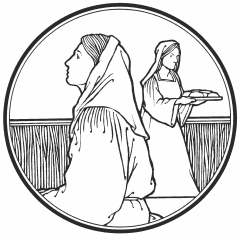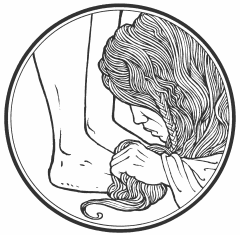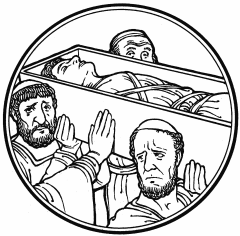 Grace, mercy, and peace to you from God our Father, and from our Lord and Savior, Jesus Christ, amen. The text for the sermon is the Gospel, which was read earlier.
Grace, mercy, and peace to you from God our Father, and from our Lord and Savior, Jesus Christ, amen. The text for the sermon is the Gospel, which was read earlier.
Time. It is a constant. We have the same amount of time each day: 24 hours. Some days it seems as if we have too much time on our hands, while other days it seems as if we don’t have enough time. In the end, we’re left with the same amount of time. What differentiates one person from another is how they use the time that is given them.
Looking at our Gospel reading for today, we see it start out so wonderfully. Martha opens her home to Jesus as He travels by and through her village. Her sister, Mary, is also present and spends time with Jesus at the house. The Lord has stopped in and will stay for a meal. Nothing could be better than that, or could it?
Now, both sisters face a choice as to how they will spend their time with Jesus. Martha hustles and bustles in the kitchen, arranging pots and pans, firing up the stove to prepare a meal. Her time is devoted to preparing the table, the food, or the many things necessary to serve Jesus. It’s possible that some of the other disciples were there and hungry also. For Martha, her main priority when Jesus visits is preparation for serving a meal.
Mary, on the other hand, just sits. She is nestled in the comfort that is found sitting at the feet of Jesus. She is there, listening to every word that Jesus speaks and she is all ears to what is being said. It is quite rare that one would have such an intimate visit from Jesus like this and Mary was not about to squander such an opportunity.
Unfortunately, this isn’t a nice and pretty picture of Jesus’ visit because Martha was bothered at doing all the work while Mary sat and did nothing. Mary’s choice appears so self-centered to Martha that she can’t contain herself any longer. She finally blurts out, “Lord, do you not care that my sister has left me to serve alone? Tell her then to help me.” There it is. Martha feels a little better because she finally got it off of her chest. What she wants is help from Mary and she’s not getting it. Surely Jesus will be hungry enough that He will tell Mary to go into the kitchen and help Martha prepare the meal. Surely Jesus will get through to Mary that she’s being lazy.
Instead of siding with Martha, Jesus sides with Mary, and with good reason. He tells Martha, “Martha, Martha, you are anxious and troubled about many things, but one thing is necessary. Mary has chosen the good portion, which will not be taken away from her.” You see, this is the time appointed for both Mary and Martha to hear Jesus, to listen to His Word, and nothing else is more important. That Word of Jesus is the one necessary thing at this moment.
What is Martha’s problem and often as our problem as well? It is not understanding the purpose of Jesus. Martha seems determined to serve Jesus while He is with them, regardless of what Mary is doing. But Jesus isn’t there to be served. Remember what Jesus says: “the Son of Man came not to be served but to serve, and to give his life as a ransom for many.” What is Jesus bringing Mary and Martha? Jesus comes not to receive a free meal from Mary and Martha, but to bring to them His Word.
Why do we come to the Lord’s house? Do we come to do something special for God, as if our coming is some good work that we do for God? No, we come to be served by God. We come to receive from God’s bounteous hand. We come to receive Jesus – to receive forgiveness, life, and salvation that only Jesus can bring. We come to receive gifts, gifts which we can receive nowhere else.
Believe it or not, you are here this morning to be fed. I don’t mean being fed by eating treats between services. You are here to be fed with the gifts of God. Jesus is speaking of being in the Word. He says in John’s Gospel, “You search the Scriptures because you think that in them you have eternal life; and it is they that bear witness about me.” Here Jesus teaches that the best way to get to know Him is to get to know the Scriptures. Really, isn’t that why we’re here?
However, for Martha, she missed Jesus’ true reason for being there. While Mary seemed lazy, she was doing exactly what Jesus had wanted: she was sitting at His feet and listening to His Word. That is what God desires of His people, that we gather around His Word. We should all be familiar with the Third Commandment: “Remember the Sabbath day by keeping it holy.” And we should also be familiar with Luther’s Explanation: “We should fear and love God so that we do not despise preaching and His Word, but hold it sacred and gladly hear and learn it.”
When focused on the wrong thing, Jesus shows to Martha her spiritual danger. He calls her by name twice, showing love, compassion and deep concern for her spiritual well-being. He wants to feed her, not be fed by her. He wants to give her Himself, for it is Jesus alone that brings salvation.
That is exactly what Jesus does for us. When we have sinned, when we have turned away from Him, Jesus doesn’t leave us in despair. He doesn’t turn His back on us. No, instead of leaving us to our sinful ways, He comes to us and says, “I forgive you. I died so that you might live.” Listen to the words that we sing: “Lord, to whom shall we go? You have the words of eternal life.” These are the words of St. Peter directed to our Lord. Our Lord promises us, “If you abide in my Word, you are truly my disciples, and you will know the truth, and the truth will set you free.” That is exactly what our Lord has done for all who believe in Him. The truth, His truth, the truth about the work of Jesus Christ for us, has set us free.
The promise that Jesus made was not only intended for Mary and Martha, but it was intended for you as well. By His death on the cross, He defeats death; by the shedding of His blood, he cleanses us from all sin and blots out every transgression; by His resurrection, it is declared that God has accepted this sacrifice in your place.
How can anything or anyone be more important than the gift which our Lord gives to us? How can you and I neglect such eternal blessings that come from Christ and His Word of forgiveness? With everything that our Lord says and does, you would think that we would flock to Jesus and the salvation that He grants to us. But instead, we find that the opposite is true. We flock towards those things that bring earthly pleasure and make us happy. We flock to those things which may promise eternal life in heaven, but in the end, fall flat on their empty promises. The promise that Jesus makes for you is one that is indeed most certainly true. This is not like any other promise that you have ever heard or will ever hear again, for this promise of Jesus will give to you eternal life.
When being a Christian may seem unpopular, when following Jesus is ridiculed, we humbly sit at the feet of Jesus and listen. We receive the riches and treasures of heaven, for Jesus has promised, “Blessed rather are those who hear the word of God.” In Jesus’ name, amen. Now the peace of God that passes all understanding, keep your hearts and minds through faith in Christ Jesus, amen.


